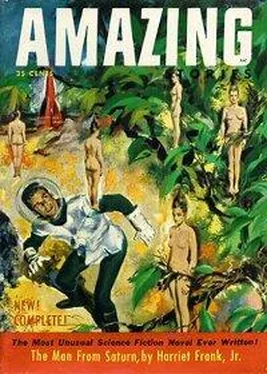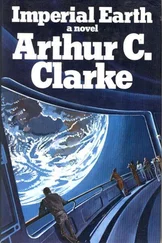Arthur Clarke - Expedition to Earth
Здесь есть возможность читать онлайн «Arthur Clarke - Expedition to Earth» весь текст электронной книги совершенно бесплатно (целиком полную версию без сокращений). В некоторых случаях можно слушать аудио, скачать через торрент в формате fb2 и присутствует краткое содержание. Год выпуска: 1953, Издательство: Ziff-Davis Publishing Company, Жанр: Фантастика и фэнтези, на английском языке. Описание произведения, (предисловие) а так же отзывы посетителей доступны на портале библиотеки ЛибКат.
- Название:Expedition to Earth
- Автор:
- Издательство:Ziff-Davis Publishing Company
- Жанр:
- Год:1953
- ISBN:нет данных
- Рейтинг книги:5 / 5. Голосов: 1
-
Избранное:Добавить в избранное
- Отзывы:
-
Ваша оценка:
- 100
- 1
- 2
- 3
- 4
- 5
Expedition to Earth: краткое содержание, описание и аннотация
Предлагаем к чтению аннотацию, описание, краткое содержание или предисловие (зависит от того, что написал сам автор книги «Expedition to Earth»). Если вы не нашли необходимую информацию о книге — напишите в комментариях, мы постараемся отыскать её.
Expedition to Earth — читать онлайн бесплатно полную книгу (весь текст) целиком
Ниже представлен текст книги, разбитый по страницам. Система сохранения места последней прочитанной страницы, позволяет с удобством читать онлайн бесплатно книгу «Expedition to Earth», без необходимости каждый раз заново искать на чём Вы остановились. Поставьте закладку, и сможете в любой момент перейти на страницу, на которой закончили чтение.
Интервал:
Закладка:
Expedition to Earth
by Arthur C. Clarke
It was in the last days of the Empire. The tiny ship was far from home, and almost a hundred light-years from the great parent vessel searching through the loosely packed stars at the rim of the Milky Way. But even here it could not escape from the shadow that lay across civilization: beneath that shadow, pausing ever and again in their work to wonder how their distant homes were faring, the scientists of the Galactic Survey still laboured at their never-ending task.
The ship held only three occupants, but among them they carried knowledge of many sciences, and the experience of half a lifetime in space. After the long interstellar night, the star ahead was warming their spirits as they dropped down towards its fires. A little more golden, a trifle more brilliant than the sun that now seemed a legend of their childhood. They knew from past experience that the chance of locating planets here was more than ninety percent, and for the moment they forgot all else in the excitement of discovery.
They found the first planet within minutes of coming to rest. It was a giant, of a familiar type, too cold for protoplasmic life and probably possessing no stable surface. So they turned their search sunward, and presently were rewarded.
It was a world that made their hearts ache for home, a world where everything was hauntingly familiar, yet never quite the same. Two great land masses floated in blue-green seas, capped by ice at both poles. There were some desert regions, but the larger part of the planet was obviously fertile. Even from this distance, the signs of vegetation were unmistakably clear.
They gazed hungrily at the expanding landscape as they fell down into the atmosphere, heading towards noon in the subtropics. The ship plummeted through cloudless skies towards a great river, checked its fall with a surge of soundless power, and came to rest among the long grasses by the water’s edge.
No one moved: there was nothing to be done until the automatic instruments had finished their work. Then a bell tinkled softly and the lights on the control board flashed in a pattern of meaningful chaos. Captain Altman rose to his feet with a sigh of relief.
“We’re in luck,” he said. “We can go outside without protection, if the pathogenic tests are satisfactory. What did you make of the place as we came in, Bertrond?”
“Geologically stable—no active volcanoes, at least. I didn’t see any trace of cities, but that proves nothing. If there’s a civilization here, it may have passed that stage.”
“Or not reached it yet?”
Bertrond shrugged. “Either’s just as likely. It may take us some time to find out on a planet this size.”
“More time than we’ve got,” said Clindar, glancing at the communications panel that linked them to the mother ship and thence to the Galaxy’s threatened heart. For a moment there was a gloomy silence. Then Clindar walked to the control board and pressed a pattern of keys with automatic skill.
With a slight jar, a section of the hull slid aside and the fourth member of the crew stepped out on to the new planet, flexing metal limbs and adjusting servomotors to the unaccustomed gravity. Inside the ship, a television screen glimmered into life, revealing a long vista of waving grasses, some trees in the middle distance, and a glimpse of the great river. Clindar punched a button, and the picture flowed steadily across the screen as the robot turned its head.
“Which way shall we go?” Clindar asked.
“Let’s have a look at those trees,” Altman replied. “If there’s any animal life we’ll find it there.”
“Look!” cried Bertrond. “A bird!”
Clindar’s fingers flew over the keyboard: the picture centred on the tiny speck that had suddenly appeared on the left of the screen, and expanded rapidly as the robot’s tele-photo lens came into action.
“You’re right,” he said. “Feather—beak—well up the evolutionary ladder. This place looks promising. I’ll start the camera.”
The swaying motion of the picture as the robot walked forward did not distract them: they had grown accustomed to it long ago. But they had never become reconciled to this exploration by proxy when all their impulses cried out to them to leave the ship, to run through the grass and to feel the wind blowing against their faces. Yet it was too great a risk to take, even on a world that seemed as fair as this. There was always a skull hidden behind Nature’s most smiling face. Wild beasts, poisonous reptiles, quagmires—death could come to the unwary explorer in a thousand disguises. And worst of all were the invisible enemies, the bacteria and viruses against which the only defence might often be a thousand light-years away.
A robot could laugh at all these dangers and even if, as sometimes happened, it encountered a beast powerful enough to destroy it—well, machines could always be replaced.
They met nothing on the walk across the grasslands. If any small animals were disturbed by the robot’s passage, they kept outside its field of vision. Clindar slowed the machine as it approached the trees, and the watchers in the spaceship flinched involuntarily at the branches that appeared to slash across their eyes. The picture dimmed for a moment before the controls readjusted themselves to the weaker illumination; then it came back to normal.
The forest was full of life. It lurked in the undergrowth, clambered among the branches, flew through the air. It fled chattering and gibbering through the trees as the robot advanced. And all the while the automatic cameras were recording the pictures that formed on the screen, gathering material for the biologists to analyse when the ship returned to base .
Clindar breathed a sigh of relief when the trees suddenly thinned. It was exhausting work, keeping the robot from smashing into obstacles as it moved through the forest, but on open ground it could take care of itself. Then the picture trembled as if beneath a hammer blow, there was a grinding metallic thud, and the whole scene swept vertiginously upward as the robot toppled and fell.
“What’s that?” cried Altaian. “Did you trip?”
“No,” said Clindar grimly, his fingers flying over the key board. “Something attacked from the rear. I hope… ah… I’ve still got control.”
He brought the robot to a sitting position and swivelled its head. It did not take long to find the cause of the trouble. Standing a few feet away, and lashing its tail angrily, was a large quadruped with a most ferocious set of teeth. At the moment it was, fairly obviously, trying to decide whether to attack again.
Slowly, the robot rose to its feet, and as it did so the great beast crouched to spring. A smile flitted across Clindar’s face: he knew how to deal with this situation. His thumb felt for the seldom-used key labelled “Siren”.
The forest echoed with a hideous undulating scream from the robot’s concealed speaker, and the machine advanced to meet its adversary, arms flailing in front of it. The startled beast almost fell over backwards in its effort to turn, and in seconds was gone from sight.
“Now I suppose we’ll have to wait a couple of hours until everything comes out of hiding again,” said Bertrond ruefully.
“I don’t know much about animal psychology,” interjected Altaian, “but is it usual for them to attack something completely unfamiliar?”
“Some will attack anything that moves, but that’s unusual. Normally they attack only for food, or if they’ve already been threatened. What are you driving at? Do you suggest that there are other robots on this planet?”
“Certainly not. But our carnivorous friend may have mistaken our machine for a more edible biped. Don’t you think that this opening in the jungle is rather unnatural? It could easily be a path.”
Читать дальшеИнтервал:
Закладка:
Похожие книги на «Expedition to Earth»
Представляем Вашему вниманию похожие книги на «Expedition to Earth» списком для выбора. Мы отобрали схожую по названию и смыслу литературу в надежде предоставить читателям больше вариантов отыскать новые, интересные, ещё непрочитанные произведения.
Обсуждение, отзывы о книге «Expedition to Earth» и просто собственные мнения читателей. Оставьте ваши комментарии, напишите, что Вы думаете о произведении, его смысле или главных героях. Укажите что конкретно понравилось, а что нет, и почему Вы так считаете.











